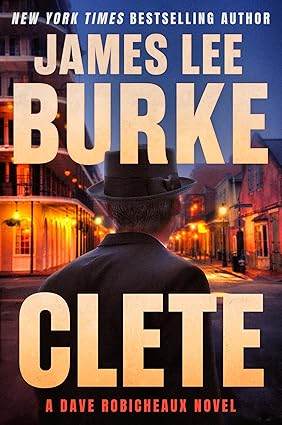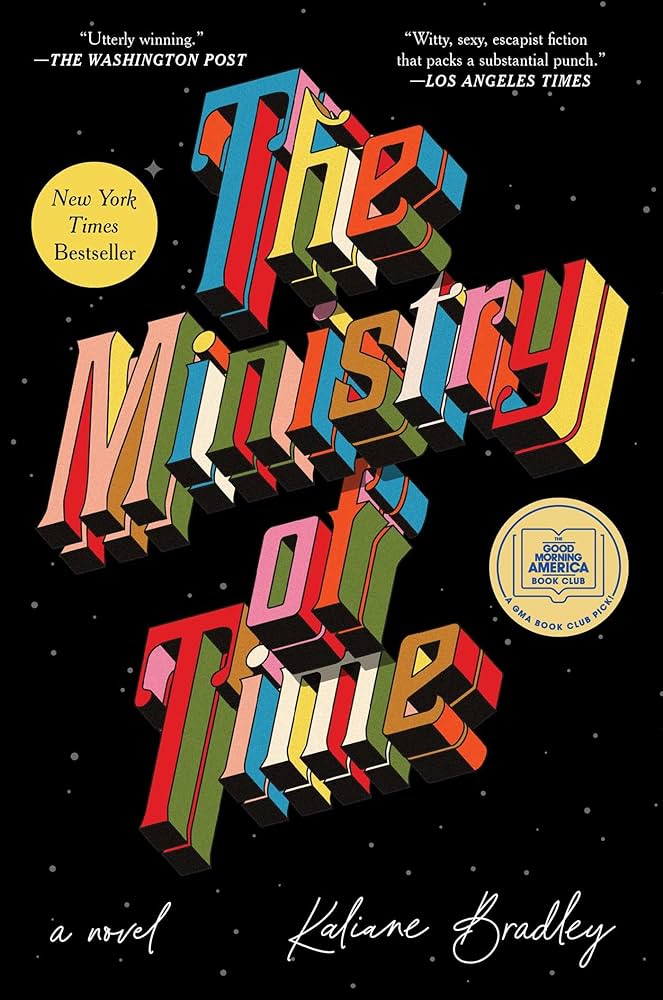Clete by James Lee Burke
 I’m a big James Lee Burke fan—he’s one of the few writers that I buy in hardcover and this book, the 24th in the Dave Robicheaux-New Iberia series cemented his spot at the top of my list. The focus is not on Robicheaux, but on his former partner, Clete Purcel, who usually plays the id to Robicheaux’s superego.
I’m a big James Lee Burke fan—he’s one of the few writers that I buy in hardcover and this book, the 24th in the Dave Robicheaux-New Iberia series cemented his spot at the top of my list. The focus is not on Robicheaux, but on his former partner, Clete Purcel, who usually plays the id to Robicheaux’s superego.
There’s plenty of action—starting with a group of drug thugs ransacking Clete’s car and the plot careens onward from there – with antisemitic drug killers, corrupt cops, wealthy schemers, and more. The key to the story though is the fleshing out and reversal of the Robicheaux-Purcel relationship. Clete is no longer the boozy knight errant—the id to Robicheaux’s superego, but an equally damaged and complex character. We see a new Clete, who had always been there.
Burke’s mysticism is present in the book. It’s an aspect of his writing that can be puzzling or frustrating at times, at least to me, but here we see the visions through Clete’s eyes (or his mind’s eye) and they are no longer a feature of Robicheaux’s psyche and religiosity, but a reflection of the eternal nature of good and evil.
Clete is not for everyone, but I think it’s one of Burke’s best.
Honey by Victor Lodato
Everyone should read this book. For my money, Victor Lodato is right up there with Burke, but with a focus on empathy and understanding rather than violence and evil. He manages to put himself in the minds of the unlikeliest characters–here an octogenarian returning to her New Jersey roots. You’ll come away looking a people in a different light.
You can check out my interview with Victor here.
Devils Island by Midge Raymond and John Yunker
You can find my review here in Ashland. News
In “Devils Island,” Midge Raymond and John Yunker bring together exotic locales, environmentalism, and murder in a whodunit with a sharp psychological edge.
The “devils” on Devils Island ostensibly refer to Tasmanian devils, large carnivorous marsupials who are in danger of extinction due to a facial tumor disease. Could they kill a human? Would they? [More]
 The Ministry of Time: A Novel by Kaliane Bradley
The Ministry of Time: A Novel by Kaliane Bradley
I was attracted by the buzz around this book and wasn’t disappointed. It’s part science fantasy, part dystopian thriller, and part romance, all of which come together nicely. The key concept: that people close to death in another time can be traveled to the present – through a mysterious door. It’s an interesting idea that that the author doesn’t try to over explain either or that she never quite explains enough (depending on your perspective). The thriller aspect has to do with the bureaucracy and infighting surrounds the time door (some of which is cross-temporal). The romance and relationships evolved naturally and there was an interesting theme of travelers out of place learning to fit on, or not.
The ending felt a bit rushed, but it had a nice twist which I didn’t see coming.
2034 and 2054 by Elliot Ackerman and James G. Stavridis
I saw my wife breezing through these and gave them a try. Both were good propulsive stories, 2034, about the start of a cyber-cum-nuclear war between the US and China was compelling and through provoking (with an octogenarian Vladimir Putin just offstage). We see the role that leadership and individual history plays in creating and avoiding war and the potential role of nations like India and Iran in bringing too proud nations to the table. 2054 brings back some of the same characters and adds some new ones as nations and corporations search for the Singularity and remote genetic editing becomes a weapon of assassination. It’s less compelling—more of a politic thriller (insurrection, impeachment, etc.) than the tenser 2034 and the characters are less compelling. But both are worth reading.
The KGB Plays Chess: The Soviet Secret Police and the Fight for the World Chess Crown
Chess is a rough game—recently a player tried to poison her rival by spreading mercury on the chess board; she was caught.
There’s the Magnus Carlsen-Han Neimann imbroglio too. But for sheer chicanery it’s hard to beat the Soviet secret police. The KGB Plays Chess:The Soviet Secret Police and the Fight for the World Chess Crown by a quartet of authors: Boris Gulko, Victor Korchnoi, Yuri Felshtinsky, and Vladimir Popov tells the story of the KGB’s role picking favorites in the chess world and trying to ensure their success. Gulko and Korchnoi are well-known players – Gulko and his wife the Women’s Grandmaster Anna Akhsharumova, were prominent refuseniks during the 1970s and 1980s, persecuted and final allowed to emigrate after Glasnost. Korchnoi played two world championship matches against Anatoly Karpov with the KGB arrayed against him and even planning his possible assassination. Yuri Felshtinsky is a Russian-American journalist and historian, who contributed a (fairly academic) discussion of KGB influence on sport in general.… , And Vladimir Popov was a Colonel in the KGB from 1972-1991, whose personal archives include copies of KGB case files.
Much of the book focuses on Gulko’s tragic story. Kornchoi’s story, told in depth elsewhere, gets less ink. And there is plenty about the KGBs role in sports more generally and inside information on KGB favorites and informers and those who resisted the KGB.
According to the book, Anatoly Karpov was a agent (code name “Raul”) who was continually aided by the KGB. And the book names various others said to be informers or agents, including Tigran Petrosian, Lev Polugaevsky, Rafael Vaganian, and Eduard Gufeld, as well as former FIDE President Florencio Campomanes.
The book suffers a bit from having four different authors and styles and would benefit from better documentations rather than mere recollection. But it is a good roadmap to some future historian’s study of state-sanctioned fixing in chess for political and ideological reasons.

 Follow
Follow